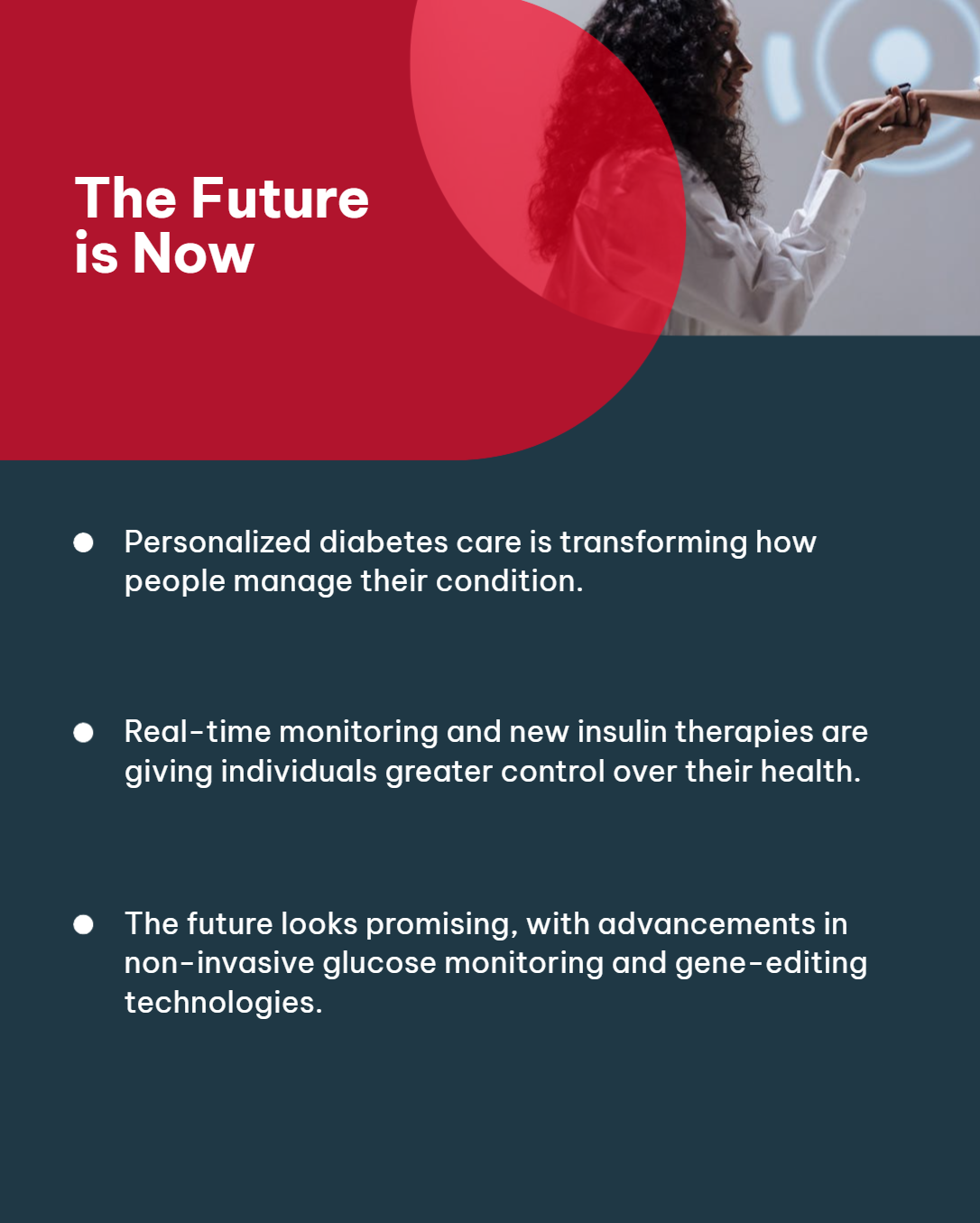Diabetes management has evolved significantly over the years, thanks to technological advancements and novel insulin therapies. The push towards personalized diabetes care has been driven by the need for more efficient, patient-centric, and real-time solutions.
Traditional diabetes management approaches often rely on one-size-fits-all solutions. However, every individual’s body responds differently to insulin, diet, and exercise. The advent of precision medicine has paved the way for tailored treatment plans, considering unique genetic, lifestyle, and metabolic factors.
The goal is simple: empower individuals with diabetes to take control of their health through real-time monitoring and personalized insulin therapies.

Continuous Glucose Monitors (CGMs) and Their Evolution
CGMs have revolutionized diabetes care by providing real-time glucose readings without the need for frequent finger pricks. These wearable sensors track glucose levels 24/7, allowing patients to make informed decisions about their diet, activity, and insulin use.
Features of Advanced CGMs
Latest CGM Innovations

Artificial Intelligence (AI) is playing a crucial role in making CGMs smarter. AI-powered predictive analytics can:
Example: Apps like Sugarmate and MySugr use AI to analyze CGM data and provide real-time suggestions for better control.
Smart Insulin Pens: Precision Dosing in Your Hands
Traditional insulin injections require manual calculations, often leading to inaccurate dosing. Smart insulin pens help optimize insulin delivery by:
Notable Smart Insulin Pens:
Traditional insulin can take up to 30 minutes to start working. Ultra-rapid-acting insulins work within minutes, allowing for better mealtime glucose control.
Latest Ultra-Rapid Insulins
These insulins mimic natural insulin response, reducing the risk of post-meal glucose spikes.
A closed-loop insulin delivery system, also known as the artificial pancreas, is a groundbreaking innovation that automates insulin delivery based on real-time glucose levels.
How It Works:
Notable Systems:
Stem Cell Therapy: A Potential Cure?
Scientists are exploring stem cell-derived beta cells to replace damaged insulin-producing cells. Companies like Vertex Pharmaceuticals have already conducted clinical trials, showing promise in Type 1 diabetes reversal.
While still in early stages, gene therapy has the potential to offer a permanent solution to diabetes.
Personalized diabetes care extends beyond insulin and monitoring—it includes nutrition optimization. AI-based meal planning apps now offer:
Glycemic Index tracking for better food choices.
Custom carb-counting solutions based on metabolic data.
Personalized meal recommendations using CGM data.
Apps like Nutrino & GlucoseZone analyze blood sugar trends and suggest tailored diet plans.

The future of diabetes management is moving towards fully automated, AI-powered, and patient-specific care. Emerging technologies will continue to focus on:
Non-invasive glucose monitoring (patches, wearable sensors).
Smart insulin pumps with voice control.
Gene-editing breakthroughs to permanently treat diabetes.

1. How accurate are CGMs compared to fingerstick tests?
CGMs are highly accurate, but fingerstick tests may still be needed for calibration or confirmation of unusual readings.
2. Can AI completely replace human intervention in diabetes management?
AI enhances decision-making but does not replace human intervention. Patients and healthcare providers should work together for optimal results.
3. Are smart insulin pens covered by insurance?
Many smart insulin pens are covered by insurance, but coverage varies by provider. Patients should check with their insurance company.
4. How soon will we see a diabetes cure?
Gene therapy and stem cell research are promising, but a complete cure is still years away. However, treatments continue to improve quality of life.
5. Do all diabetics benefit from real-time monitoring?
While CGMs are particularly beneficial for Type 1 diabetics, many Type 2 diabetics also see improved glucose control with real-time monitoring.